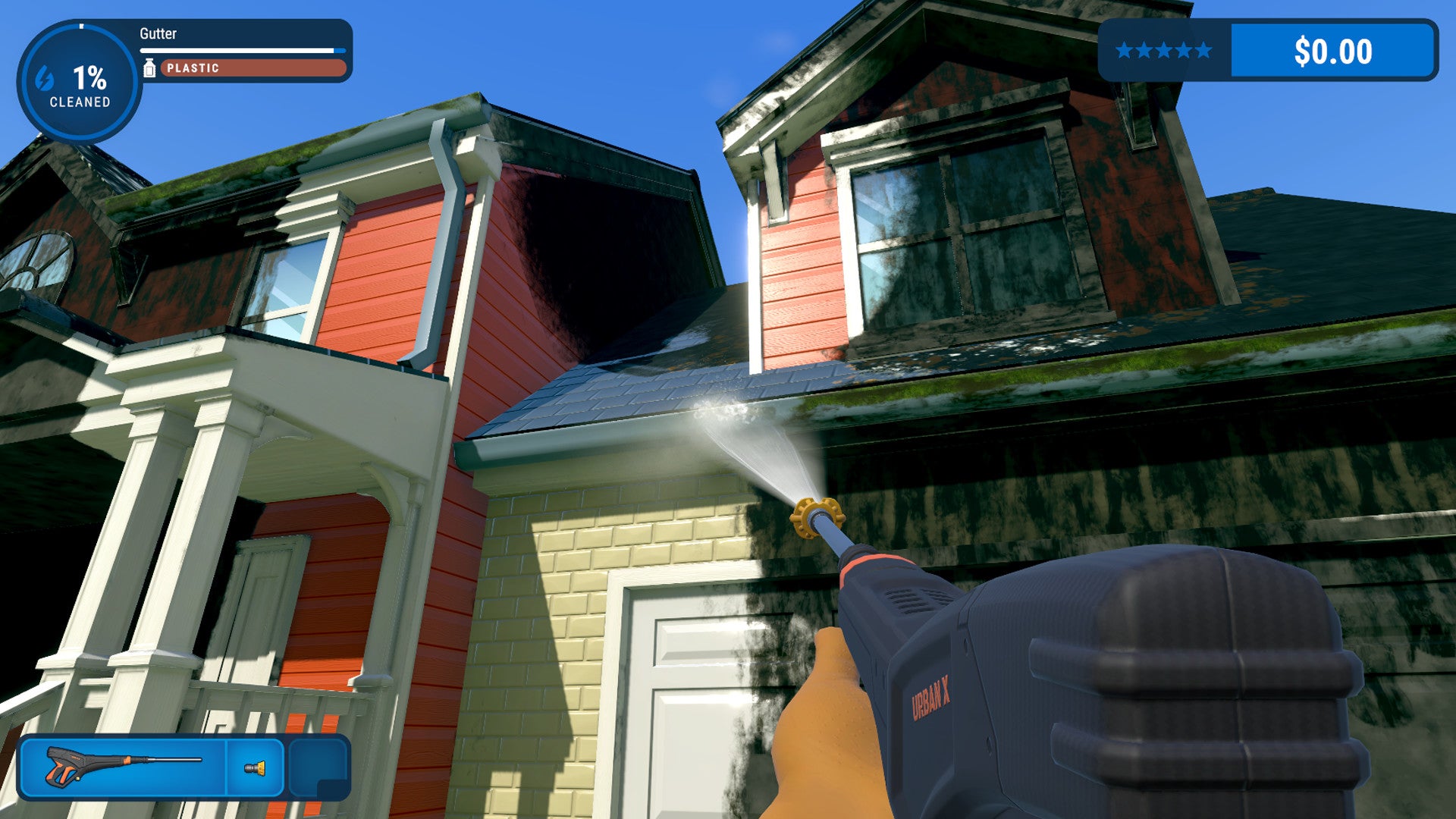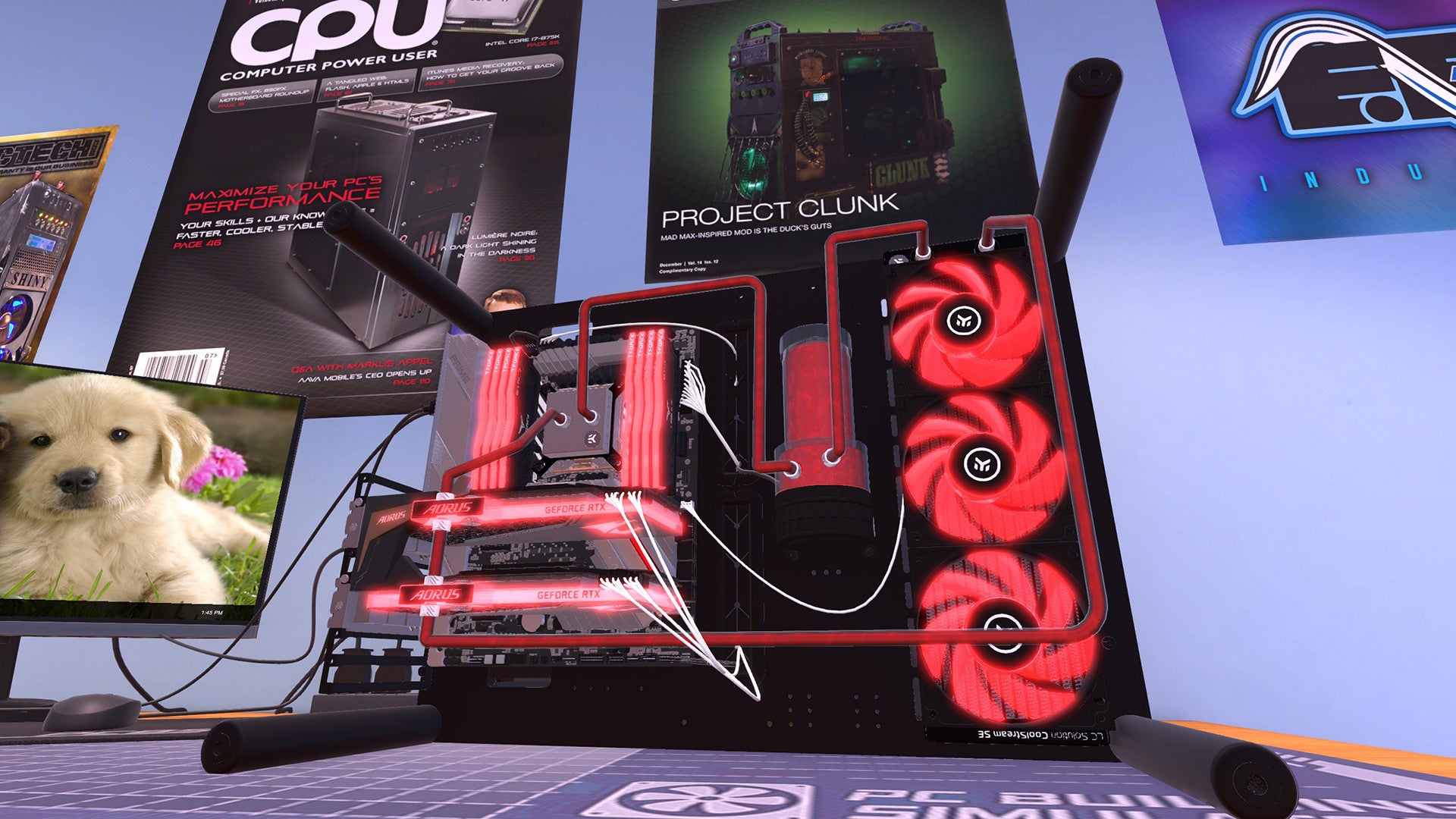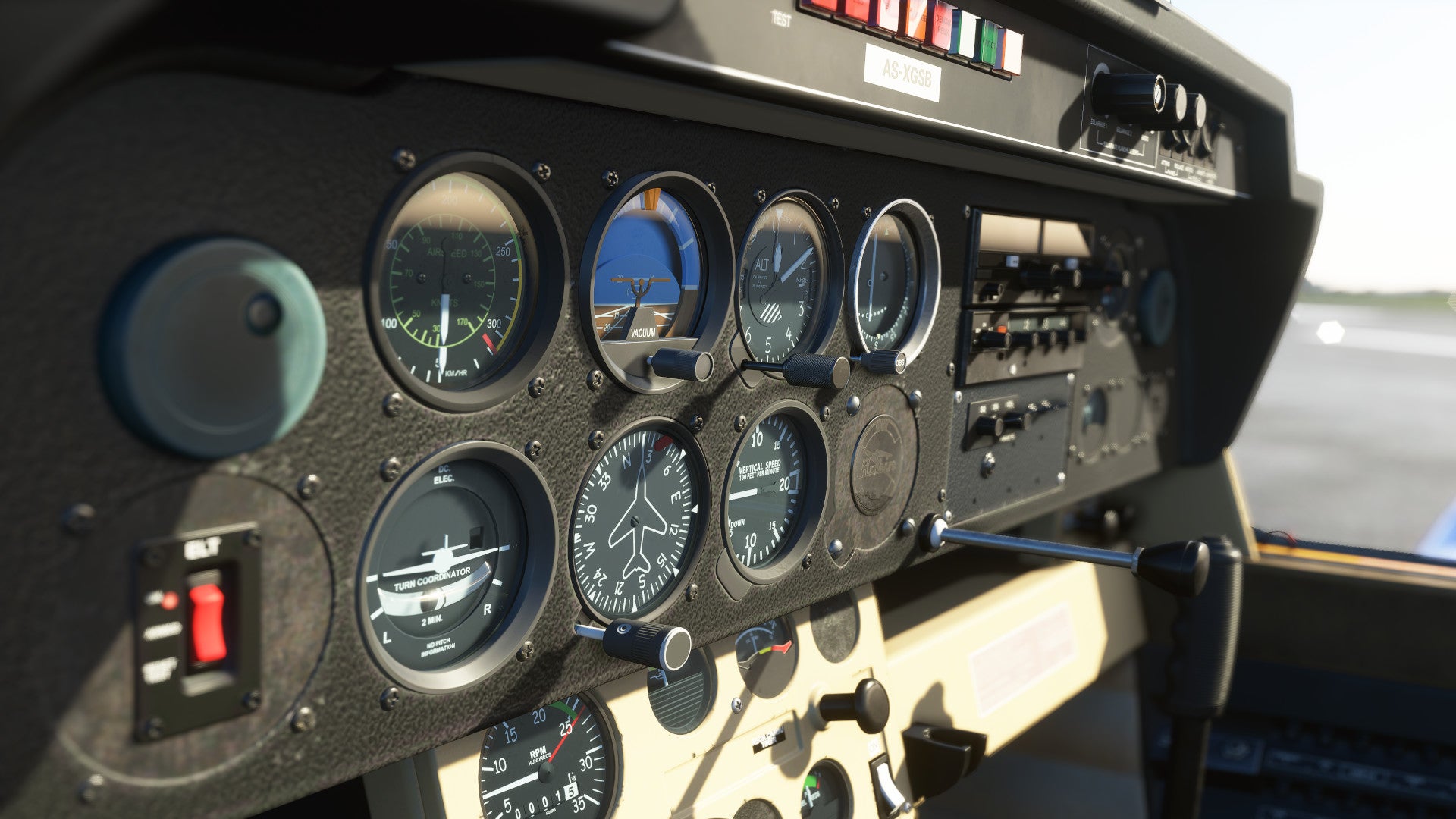“Kirsty [Rigden], my wife and business partner, had been a member for a number of months,” says James Marsden, creative director of FuturLab. “There’s etiquette to those videos - if an upload is not done in a certain, meticulous fashion, it gets rejected. You’re not allowed to do it barefoot, because that might stress people out.” The same phenomenon is happening on YouTube: videos with NSFW titles like Pressure Washing Sweet Old Lady’s Nasty Dirty Brick Steps For Free get millions of views. Except what’s on offer is perfectly innocent - the binary gratification of seeing muddy steps made gleaming, brick by brick. “There’s something there,” Marsden realised. “The idea of making a simulator where all you do is clean in this very precise, razor-like fashion - you’re effectively going to have the exact same experience, but you’re going to be in control. It’s going to be more satisfying.” And so it proved. FuturLab’s PowerWash Simulator has now been rated Overwhelmingly Positive by thousands on Steam - where it’s advertised as a way to “release the pressure” and “wash away your worries.” The fantasy is the same as that sold in TV promotions for cleaning products through the ages: a rare problem that can be wiped away in an instant, leaving a brighter world in its place. And it is a fantasy - as escapist as any sword and sorcery RPG or Rambo-style shooter. Increasingly, sim developers are finding huge success in recreating the everyday - or at least, idealised versions of it. “This is more like what you think power washing is, rather than what it really is,” says PowerWash Sim’s lead designer, Dan Chequer. “With none of the downside of blowback or your feet getting wet.” There’s no back-ache stamina mechanic in PowerWash Sim, nor any risk of dirt transferring from one surface to another. All the setbacks and exasperation that might sour a satisfying task have been sanded away (and yes, before you ask, there is a sanding simulator out there). The doubly popular PC Building Simulator offers a similar sense of safety - you’re not going to fry a component, or yourself, in the course of playing. “We worked hard to make sure that the game gives you the right kind of problems at the right cadence with the right spread of rewards,” says John Duffill, PC Building Sim’s design lead. Yet its fantasy hinges, paradoxically, on a commitment to realism. “The PC scene is very spec focussed with a lot of knowledge about components and manufacturers,” Duffill says. “It mirrors the car-tuning scene in that sense. It’s the same fantasy as you get in any video game - the person wants to experience something without the cost, be it financial or time.” PC Building Sim isn’t only a testing ground for theoretical rigs, however, nor just a bottomless well of self-set puzzles. It’s also, as its team has discovered, “zen.” It transpires that carrying out a process laboriously by hand can ground you, in a way the simplified inputs of AAA games rarely do. “Having a series of repetitive actions or steps to go through is the basis of a lot of meditation,” Duffill points out. “Look at yoga or woodworking. Doing things that move the mind from the past or the future to concentrate on the present is good for you, and I think that’s why a lot of people enjoy modern simulation titles.” The head of Microsoft Flight Simulator, Jorg Neumann, is especially familiar with the counterintuitive allure of overcomplicated apparatus. “Simmers are looking for authenticity and accuracy, and the appeal lies in learning, understanding, and mastering complex systems,” he says. “Even for more casual players, achieving something that initially seemed too complicated or even impossible can provide fun that is sometimes unexpected.” PC Building Sim layers its tactile machine assembly with a touch of management, casting you as a small business owner. “Almost all sim games come from the angle of you becoming a success in the space, by earning and progressing,” Duffill says. “The business angle gives the player a ready-made framework around which they can build a narrative and keep on playing.” But FuturLab, by contrast, ultimately rejected anything that wasn’t central to PowerWash Sim’s soothing experience. “When we were pitching to publishers the questions were, ‘Where’s the variety to keep someone interested?,’” Marsden says. “And with other simulators, you might be inclined to bolt other aspects on like management. In PC Building Simulator you unscrew every individual screw in order to put graphics cards in. The core mechanic in PowerWash Sim is just changing one pixel of dirt to a pixel of clean, and for some reason that is compelling all day long. “If you throw in some soothing sound and some interesting objects to wash, and it’s always done under a bright blue sky and there’s no time pressure, then suddenly you have a meditative experience where there’s no antagonism.” “The fact that the game isn’t deliberately trying to keep you there is what’s, ironically, keeping people there,” adds Chequer. Meditative simulation offers a break not just from the frenetic pace of action games, Marsden suggests, but the exhaustion of second-screen social media and a 24 hour news cycle: “We’ve seen a few Steam reviews saying, ‘I’ve not been able to focus on one thing for longer than 20 minutes for months’. But people have been able to play PowerWash Simulator for hours at a time - the sun comes up and goes down again and they don’t even notice. It lets the brain disconnect and actually get a rest. We’re exploring ways of genuinely investigating whether this has mental health benefits for people.” Many Microsoft Flight Sim players have told Neumann that they boot up his game when they get home from work to de-stress. He believes that’s less about the tactile and meditative controls of a plane, though, and more to do with the uncanny sense of freedom and unboundedness inherent to flight. “In my view, one ends up deeply appreciating the world itself,” he says. “Be it the glorious mountains of the Alps, or the Sahara desert, or just somewhere over the ocean.” Yet despite the promise of the Grand Canyon, Hong Kong, or the Great Pyramid of Giza, almost 70% players set their destination to home. The attraction of the mundane, to ground the game in something real and familiar, is too strong to resist. “Almost everyone has a few places in this world that have special meaning,” Neumann says. “The town or city where we grew up, the first apartment or house we remember living in, places we went on vacation, to school or university. I find this to be a very special element of Microsoft Flight Simulator, because the world is not fictional, but rather a representation of real life and can bring you back to all kinds of places that can have real emotional impact.” Simulators, then, have long managed to make adventure feel authentic. But nothing has highlighted their potential for escapism quite like Covid-19. Even PC Building Simulator has taken on a fantastical air since certain PC components became gold dust. And of course, for a long time, the pandemic pushed even the most humdrum forms of flight beyond reach. “With the ongoing travel restrictions in place in many parts of the world, some people have found real solace in visiting the planet, and their favourite places, in Microsoft Flight Simulator instead,” says Neumann. There’s a Leonardo Da Vinci quote his team has used as a source of inspiration since the day development began. “Once you have tasted flight, you will forever walk the earth with your eyes turned skyward, for there you have been, and there you will always long to return.”


